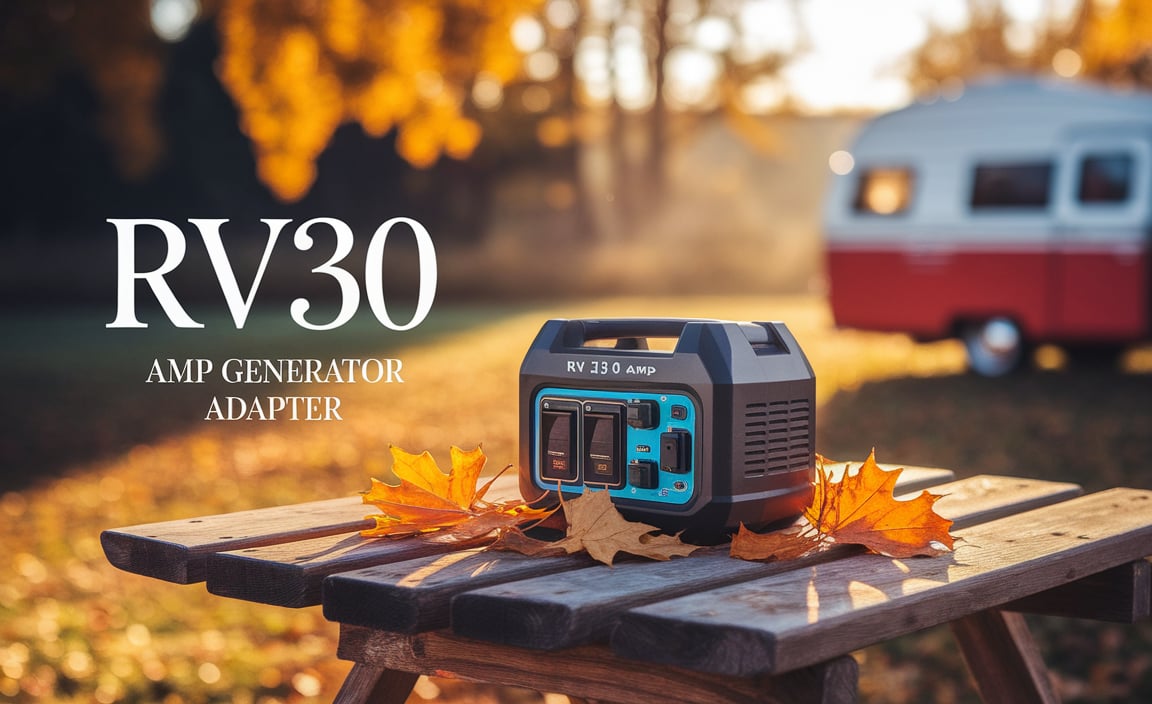An RV 30 amp adapter for generator is an indispensable piece of equipment for any RVer who wants to maintain access to essential amenities while enjoying the freedom of venturing off the beaten path. Whether you’re seeking remote campsites with no hookups or simply want a reliable backup power source, this seemingly simple adapter unlocks a world of convenience and self-sufficiency. It acts as the crucial bridge between your generator and your RV’s electrical system, ensuring that your lights, refrigerator, air conditioning, and other vital appliances can continue to function smoothly, no matter where your adventures take you. Without the right adapter, a generator, no matter how powerful, might as well be decorative when it comes to powering your home on wheels.
The beauty of an RV 30 amp generator adapter lies in its ability to transform a standard generator’s output into a format your RV can readily accept. Most RVs are equipped with a 30-amp service inlet, designed to connect to campground power pedestals. Generators, on the other hand, often come with a variety of outlets, but rarely a direct 30-amp RV-style connection. This is where the adapter steps in, featuring the correct plug configuration for your generator on one end and the familiar TT-30R receptacle (the standard RV 30-amp female plug) on the other. This standardization ensures compatibility and makes the transition from campground power to generator power seamless.

Understanding the Different Types of RV 30 Amp Adapters
When you begin your search for an rv 30 amp adapter for generator, you’ll likely encounter a few variations. The most common types are designed to connect a generator with a standard 20-amp or 15-amp household-style outlet (often a NEMA 5-15P or 5-20P plug) to your RV’s 30-amp inlet. These adapters essentially combine the available power from multiple outlets on the generator or step it up to meet the 30-amp demand. Another type connects a generator with a 30-amp outlet (often a L5-30P twist-lock plug) directly to your RV’s 30-amp inlet. It’s crucial to identify what type of outlets your generator possesses and what your RV’s power input looks like to ensure you purchase the correct adapter. Always double-check the plug configurations – a picture often helps clarify the differences between various NEMA standards.
Generator Power Requirements for Your RV
Before you even consider an adapter, it’s essential to understand your RV’s power needs. A 30-amp RV service typically provides approximately 3600 watts of power (30 amps x 120 volts). While your generator doesn’t need to match this exact wattage to run some appliances, it needs to be powerful enough to handle the peak load of your most demanding appliances, particularly your air conditioner. Many RVers find that generators in the 3000-4000 watt range are often sufficient, especially when using a “soft start” device on the AC unit, which reduces the initial surge of power required. If your generator’s continuous wattage is lower than the combined draw of your essential appliances, you might experience breaker trips or an inability to run multiple items simultaneously. Therefore, assessing your RV’s typical power consumption and comparing it to your generator’s output (and the adapter’s capabilities) is a critical first step in achieving effortless power.
The Benefits of Using an RV 30 Amp Generator Adapter
The primary benefit of an rv 30 amp adapter for generator is undoubtedly the newfound freedom it grants. No longer are you tethered to established campgrounds; you can explore national parks, remote beaches, or simply enjoy a more secluded experience in a quiet forest. This freedom extends to peace of mind. During power outages at a campsite, you can quickly deploy your generator and adapter to keep essential systems running, ensuring your comfort and security. Furthermore, it provides a crucial backup if your RV’s primary power source malfunctions.
Beyond mere convenience, these adapters contribute to the longevity of your RV’s electrical components. By ensuring a stable and correctly configured power connection, you minimize the risk of voltage fluctuations or improper grounding, which can damage sensitive electronics. Investing in a high-quality adapter from a reputable manufacturer also ensures safety, with features like proper insulation and strain relief to prevent wear and tear.
Selecting the Right Adapter: What to Look For
When choosing your rv 30 amp adapter for generator, prioritize quality and safety. Look for adapters made from durable materials that can withstand outdoor conditions. Heavy-duty insulation is essential to protect against moisture and physical damage. A well-constructed adapter will also feature secure connections that won’t easily become loose, preventing intermittent power issues. Pay attention to the gauge of the wire used; thicker gauge wires are generally better for handling higher amperages and reducing power loss over distance. Lastly, ensure the adapter is UL listed or CSA approved. These certifications indicate that the product has met rigorous safety standards, giving you confidence in its performance and reliability. Don’t be tempted by the cheapest option; a faulty adapter can be a costly and dangerous mistake.
In conclusion, an RV 30 amp generator adapter is far more than just a connectivity tool. It’s an enabler of adventure, a provider of backup, and a guardian of your RV’s electrical system. By understanding its purpose, the types available, and the crucial power considerations, you can confidently select the right adapter and unlock truly effortless power for all your travels.
